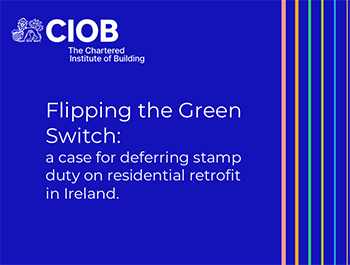CIOB proposes stamp duty deferral on fixer uppers in RoI and NI
With energy saving high on the priority lists of public and governments alike, a paper published by the Chartered Institute of Building (CIOB) explores how deferring stamp duty on properties bought, made more energy efficient and sold on, could help get more homes up to scratch sooner.
The proposal aims to encourage investors to fix up older, less energy efficient homes for resale by allowing them to defer stamp duty, thereby creating a ‘green flipping’ business model. This could provide an additional incentive to retrofit and increase the overall number of residential properties becoming more energy efficient through improved loft and wall insulation, better windows and doors and new boilers for example - good news for bill paying residents and decarbonisation commitments.
To defer the stamp duty, investors would have to have their retrofitting measures carried out and verified by suitably qualified professionals and would be required to sell on the property once work is complete. They would not be able to live it in themselves or rent it out.
Contents |
[edit] Comment
Joseph Kilroy, policy and public affairs manager for Ireland at CIOB, said: “The residential sector is proportionally the highest contributor to the built environment’s carbon emissions, a sector which is itself is responsible for almost half of national emissions. Plus, in a cost-of-living crisis with no end in sight, every possible effort must be made to reduce household energy bills.
“Our proposal in isolation will not achieve a sufficient reduction in residential emissions. However, as part of a package of measures, it could provide a stimulus to counter the stubbornly low number of residential retrofits happening in Ireland and Northern Ireland. “This measure isn't the panacea to addressing energy efficiency in the built environment, however, it goes someway to improving quality whilst enhancing energy efficiency and making better use of a tax that has been seen to be inefficient. Evidence relating to other stamp duty changes, such as the holiday period during the Covid-19 pandemic, suggests that the market reacts to such changes so this proposal could potentially underpin a much-needed new source of residential retrofit.”
John Barry, Professor of Green Political Economy at Queen’s University Belfast, said: “The failure of COP 27 in Egypt makes it more pressing for innovative policy proposals to meet climate and decarbonisation targets. A key and under-explored area are non-technological policy ideas, such as the insulation of buildings. In the context of the worsening cost of living crisis, addressing the linked climate crisis via retrofitting buildings would deliver multiple benefits, yet there is a serious problem in meeting retrofitting targets in the residential sector. This report, proposing the deferral of stamp duty on residential properties purchased for refurbishment, would go a long way to helping the speed and scale needed to decarbonise the domestic housing stock in Ireland, north and south.”
[edit] Ireland and Northern Ireland energy facts
[edit] Ireland
In Ireland the built environment sector accounts for 37% of the country’s carbon emissions
Heating, cooling, and lighting buildings – operational carbon - accounts for 23% of national emissions
Less than 25% of the housing stock is A or B rated.
[edit] Northern Ireland
In Northern Ireland residential operational emissions account for 13.7% of national emissions, primarily due to the use of fossil fuels for domestic heating
The combination of the condition of the housing stock and the sources of energy used for residential fuel means that Northern Ireland has an acute problem when it comes to residential operational emissions.
According to the 2016 Northern Ireland House Condition Survey – the latest available data – Northern Ireland’s housing stock had 61,000 dwellings deemed below the Decent Homes Standard, 160,000 dwellings in fuel poverty, and 50% of dwellings were rated below the EPC target Band C.
Read the full CIOB report here.
This article appears on the CIOB news site as "CIOB proposes stamp duty deferral on fixer uppers in RoI and NI"
--CIOB
[edit] Related articles on Designing Buildings
- Stamp duty land tax SDLT.
- Duty.
- Net Present Value.
- Retrofit.
- Refurbishment.
- Renovation.
- Renovation v refurbishment v retrofit.
- Retrofit and traditional approaches to comfort.
- Retrofit coordinator.
- Retrofit, refurbishment and the growth of connected HVAC technology.
- Search fees.
- Tax on £2m plus residential properties.
- Taxation.
Featured articles and news
Gregor Harvie argues that AI is state-sanctioned theft of IP.
Many resources for visitors aswell as new features for members.
Using technology to empower communities
The Community data platform; capturing the DNA of a place and fostering participation, for better design.
Heat pump and wind turbine sound calculations for PDRs
MCS publish updated sound calculation standards for permitted development installations.
Homes England creates largest housing-led site in the North
Successful, 34 hectare land acquisition with the residential allocation now completed.
Scottish apprenticeship training proposals
General support although better accountability and transparency is sought.
The history of building regulations
A story of belated action in response to crisis.
Moisture, fire safety and emerging trends in living walls
How wet is your wall?
Current policy explained and newly published consultation by the UK and Welsh Governments.
British architecture 1919–39. Book review.
Conservation of listed prefabs in Moseley.
Energy industry calls for urgent reform.
Heritage staff wellbeing at work survey.
A five minute introduction.
50th Golden anniversary ECA Edmundson apprentice award
Showcasing the very best electrotechnical and engineering services for half a century.
Welsh government consults on HRBs and reg changes
Seeking feedback on a new regulatory regime and a broad range of issues.
CIOB Client Guide (2nd edition) March 2025
Free download covering statutory dutyholder roles under the Building Safety Act and much more.

























